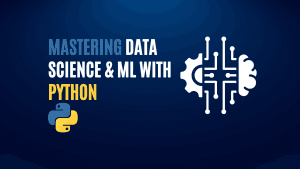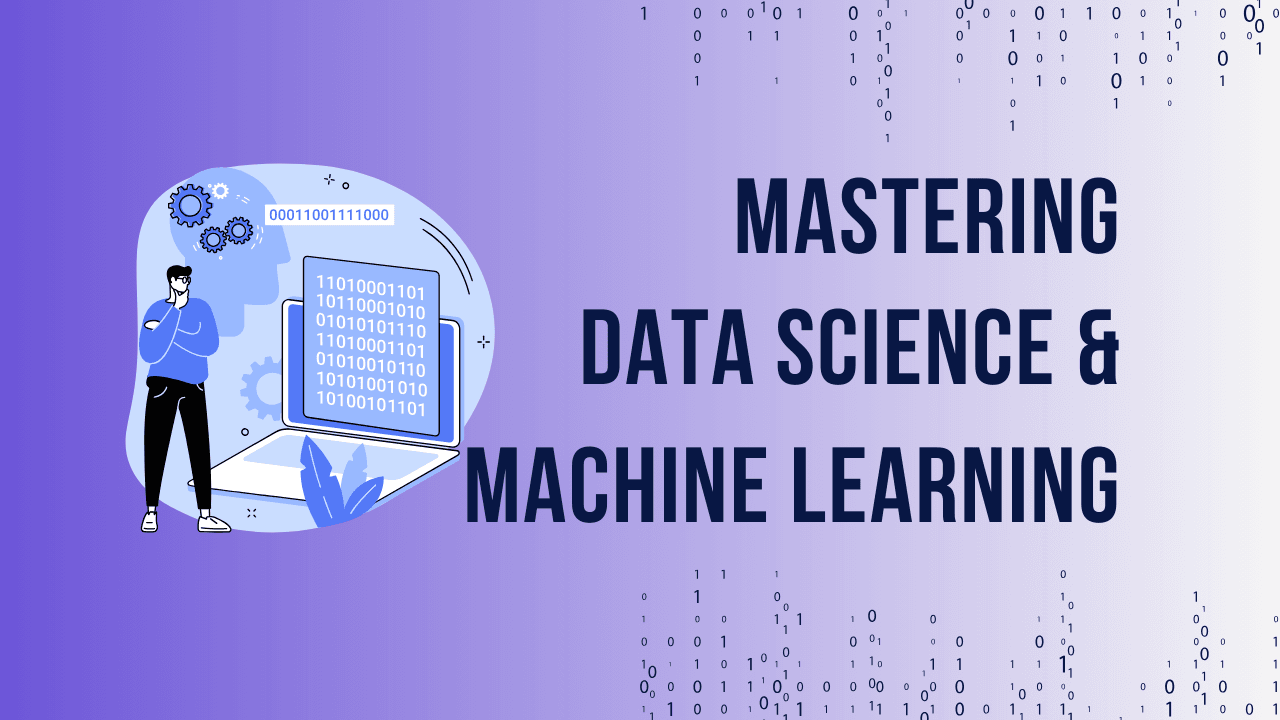Artificial Intelligence (AI) and Machine Learning (ML) are transforming various industries, from healthcare to finance. However, diving into these fields requires specific foundational knowledge and skills. In this article, we will explore the prerequisites for learning Machine Learning and AI in simple vocabulary to help anyone understand how to start their journey.
Ready to take you Data Science and Machine Learning skills to the next level? Check out our comprehensive Mastering Data Science and ML with Python course.
Table of Contents
Toggle1. Introduction to Machine Learning and AI
Machine Learning (ML) and Artificial Intelligence (AI) have become buzzwords in the tech world. These fields enable computers to learn from data and make decisions without explicit programming. Understanding these concepts is critical for anyone looking to enter the technology sector, as they are the building blocks of many modern innovations.
2. Basic Programming Skills
To start learning Machine Learning and AI, having a strong foundation in programming is essential. Python is one of the most commonly used languages due to its simplicity and the vast array of libraries available. Other languages such as R, Java, or C++ can also be helpful, but Python remains the go-to for beginners because of its ease of use.
Ready to take you Data Science and Machine Learning skills to the next level? Check out our comprehensive Mastering Data Science and ML with Python course.
3. Understanding of Mathematics
Mathematics plays a crucial role in Machine Learning. You will need to grasp several areas of mathematics, such as:
- Linear Algebra: Important for handling vectors and matrices in algorithms.
- Probability and Statistics: These are essential for making predictions and understanding the likelihood of different outcomes in Machine Learning models.
4. Familiarity with Data Structures
Data structures are the backbone of any ML system. Arrays, lists, and trees are just a few of the data structures you should know. These structures help in organizing and storing data efficiently, making algorithms perform faster.
Ready to take you Data Science and Machine Learning skills to the next level? Check out our comprehensive Mastering Data Science and ML with Python course.
5. Algorithms and Their Role
Understanding how algorithms work is another essential skill for anyone learning Machine Learning and AI. Algorithms are the rules or procedures followed by a computer to make decisions based on data. Some key algorithms in ML include:
- Supervised Learning Algorithms: Like Linear Regression and Decision Trees.
- Unsupervised Learning Algorithms: Such as K-Means Clustering.
6. Basic Knowledge of Data Science
Data Science is the foundation of Machine Learning. Before diving into ML, it’s crucial to understand how data is processed. This includes data cleaning, exploratory data analysis (EDA), and transforming raw data into formats that are usable for Machine Learning models.
Ready to take you Data Science and Machine Learning skills to the next level? Check out our comprehensive Mastering Data Science and ML with Python course.
7. Introduction to Libraries and Frameworks
Several frameworks and libraries make working with Machine Learning easier. Some of the most popular ones include:
- TensorFlow: Developed by Google for deep learning applications.
- PyTorch: Known for its flexibility in building complex models.
- Scikit-learn: A Python library for traditional Machine Learning algorithms.
Ready to take you Data Science and Machine Learning skills to the next level? Check out our comprehensive Mastering Data Science and ML with Python course.
8. Computer Science Fundamentals
In addition to programming and mathematics, understanding the basics of computer science will help you grasp more complex ML concepts. Key areas include:
- Databases: How data is stored and accessed.
- Cloud Computing: Many ML projects are hosted in the cloud due to the massive amount of data and computational power needed.
- Version Control (Git): Essential for managing and collaborating on ML projects
9. Logical and Analytical Thinking
Machine Learning requires not only technical skills but also logical and analytical thinking. This involves solving complex problems and understanding how to optimize models. Case studies of AI applications in real-world situations can help build this skill.
10. Understanding Big Data
In the world of AI and ML, data is king. The ability to work with large data sets, also known as Big Data, is a key skill. Tools like Hadoop and Spark can help in managing and processing large amounts of data efficiently.
11. Hands-on Practice
Learning ML and AI requires a lot of practice. Projects, competitions, and internships can provide real-world experience. Platforms like Kaggle offer datasets and challenges that allow you to apply what you’ve learned.
Ready to take you Data Science and Machine Learning skills to the next level? Check out our comprehensive Mastering Data Science and ML with Python course.
12. Knowledge of AI Ethics
As AI becomes more integrated into society, understanding its ethical implications is crucial. This includes issues like bias in algorithms, privacy concerns, and the potential impact on jobs. Ethical AI development should be a priority for anyone entering this field.
13. Resources for Learning ML and AI
There are numerous resources available for learning Machine Learning and AI, including:
- Books: “Hands-On Machine Learning with Scikit-Learn, Keras, and TensorFlow” by Aurélien Géron.
- Online Courses: Platforms like Coursera and Udemy offer courses taught by experts.
- Communities: Joining online communities can be a great way to stay updated and network with other learners.
14. Real-World Applications
AI and ML have far-reaching applications in industries like healthcare, finance, and e-commerce. Understanding these applications can help you see the practical impact of the technology and inspire your own projects.
15. Conclusion
Learning Machine Learning and AI requires dedication, patience, and a commitment to continuously improve. By mastering the prerequisites, such as programming, mathematics, and data science, you’ll be well on your way to a successful career in this exciting field.
Frequently Asked Questions (FAQs)
1. What programming language is best for learning Machine Learning?
Python is the most recommended language due to its simplicity and the availability of numerous ML libraries.
2. Do I need advanced math skills to learn AI?
Yes, a good understanding of linear algebra, probability, and statistics is crucial for grasping many ML algorithms.
3. Can I learn Machine Learning without a background in computer science?
While a computer science background helps, it’s not a strict requirement. Learning programming and basic computer science concepts will suffice.
4. How important is hands-on practice in learning AI?
Hands-on experience is crucial. Theoretical knowledge is important, but applying that knowledge to projects solidifies learning.
5. What are some good online resources for beginners?
Coursera, Udemy, and Kaggle offer great resources for beginners. Joining online forums like Reddit’s r/MachineLearning can also help.
6. Is Machine Learning used in everyday applications?
Yes, from recommendation systems like Netflix and YouTube to self-driving cars, ML is part of many daily applications.
Our Students Testimonials:
Ready to take you Data Science and Machine Learning skills to the next level? Check out our comprehensive Mastering Data Science and ML with Python course.



